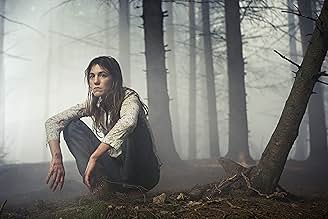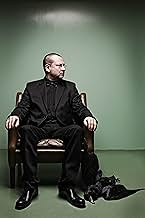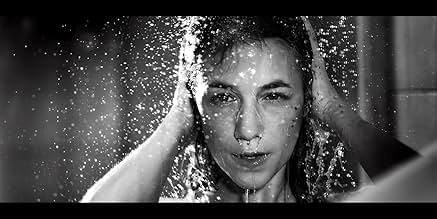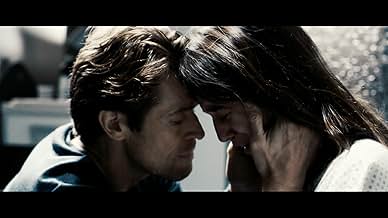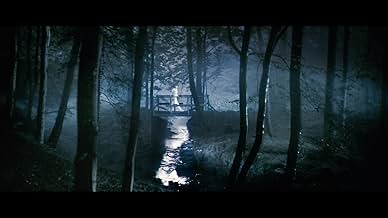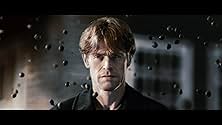Ein trauerndes Paar zieht sich in ihre Hütte im Wald zurück, in der Hoffnung, ihre gebrochenen Herzen und ihre gestörte Ehe zu reparieren, aber die Natur nimmt ihren Lauf und die Dinge gehen... Alles lesenEin trauerndes Paar zieht sich in ihre Hütte im Wald zurück, in der Hoffnung, ihre gebrochenen Herzen und ihre gestörte Ehe zu reparieren, aber die Natur nimmt ihren Lauf und die Dinge gehen von schlecht zu schlecht.Ein trauerndes Paar zieht sich in ihre Hütte im Wald zurück, in der Hoffnung, ihre gebrochenen Herzen und ihre gestörte Ehe zu reparieren, aber die Natur nimmt ihren Lauf und die Dinge gehen von schlecht zu schlecht.
- Regie
- Drehbuch
- Hauptbesetzung
- Regie
- Drehbuch
- Hauptbesetzung
- Auszeichnungen
- 21 Gewinne & 33 Nominierungen insgesamt
Empfohlene Bewertungen
An eerie yet gorgeous tapestry of lingering close-ups; parallels, cuts and slow-motion photography, Lars Von Trier's Antichrist is a gruelling tale of mythical grandeur: a bizarre yet beautiful film chock full of sadism and shagging, Satanic dogma and similes. Most of which, I don't understand. So you'll be pleased to know that I have no intention of harping on about the director's bent meditation on gender, nature, genocide, motherhood, misogyny and astronomy. I find all that stuff interesting, don't get me wrong, but when things get Freudian I'm way out of my league. Therefore, I'll stick to what I know.
Albeit seething with emotion, Antichrist refuses to adhere to some of the general "rules" of the classical Hollywood narrative, meaning it lacks clarity, unity and closure. For example, there're only two characters, both of which remain nameless and have indefinite; pasts, motives and are somewhat difficult to identify with. The film rejects conventional morality. It is a difficult and uncomfortable experience that'll unnerve even the most robust of film fans. So if you like your films light, clear and conservative, stay away. If, however, you're a fan of, say, Nicholas Roeg's Don't Look Now, director David Lynch or you just dig a bit of alternative cinema, then brace yourself for a hugely demanding tableau that film critic Anita Singh of the Sunday Telegraph dubbed "the most shocking film in the history of the Cannes Film Festival." Willem Dafoe plays "he", a therapist and husband to "she" (Charlotte Gainsbourg), the female half of the cast whose line of work we never really learn. After a quite miraculous opening montage that juxtaposes the couple making love with the accidental death of their child, the embedded tale follows the pair as they flee to "Eden", their isolated cabin in the woods, where "he" attempts to aid a severely grief stricken "she" through her bereavement.
Book-ended by a masterfully conceived prologue and epilogue and split into four focal chapters entitled "Grief", "Pain", "Despair" and "The Three Beggars" (don't ask), the film takes on a ghostlike tone from the outset as the boundaries between the real and surreal become blurred. Alas, things get weird, edgy and very, very nasty. The sheer mass and rate of dense motifs and metaphors at hand regarding sex, Freud, the devil and the soul is a little overwhelming. Not to mention the force and intensity of both Dafoe and Gainsbourg's turns in addition to the film's strong, emotional undercurrent.
In spite of large and sustained periods of quite brilliant film-making, Antichrist contains some of the most violent and deplorable images ever committed to celluloid. For the ladies there's self mutilation. For the gents there's I, I, I can't even say it. Put it this way, it ain't good lads Anyway, add to the unthinkable gore a whole host of outlandish set-ups, half a dozen scenes of a sexual nature and one or two jolts in tone and you'll be scared silly. Remember- sometimes in cinema, you fear what you don't understand, especially when the camera is an unflinching eye inside the head of a disturbed, Danish poet. Lars Von Trier is an excellent filmmaker, but even his biggest fans will find it hard to swallow this, never mind stomach it.
Dedicated to the memory of legendary soviet filmmaker Andrei Tarkovsky, Antichrist is truly as haunting, delicate and poetic a film as you're ever bound to see. Though shrouded in scenes of unspeakable cruelty, the film eludes to the work of Tarkovsky in a big way: Von Trier's warped Adam and Eve parable is a moody, metaphysical affair cloaked in hypnotic, dreamlike imagery that calls to mind the likes of Mirror, Solaris and the brilliant Stalker. The trancelike photography; sound, score, and editing demonstrate a predilection for atmospheric, art-theatre sensibility. Tarkovsky would have loved it. This, after all, is a film that simply has to be seen to be believed. Not necessarily for its aesthetic grandeur, gore or technique, but for its harrowing portrayal of a soul in torment.
What's it all about? Who cares?! Antichrist is an unusual, atmospheric horror film that's guaranteed to provoke. The performances are honest and strong, the aesthetics are bold, the direction is brilliant and the outcome is something that is ultimately hard to come by these days: authentic film-making.
Jack Harding
Albeit seething with emotion, Antichrist refuses to adhere to some of the general "rules" of the classical Hollywood narrative, meaning it lacks clarity, unity and closure. For example, there're only two characters, both of which remain nameless and have indefinite; pasts, motives and are somewhat difficult to identify with. The film rejects conventional morality. It is a difficult and uncomfortable experience that'll unnerve even the most robust of film fans. So if you like your films light, clear and conservative, stay away. If, however, you're a fan of, say, Nicholas Roeg's Don't Look Now, director David Lynch or you just dig a bit of alternative cinema, then brace yourself for a hugely demanding tableau that film critic Anita Singh of the Sunday Telegraph dubbed "the most shocking film in the history of the Cannes Film Festival." Willem Dafoe plays "he", a therapist and husband to "she" (Charlotte Gainsbourg), the female half of the cast whose line of work we never really learn. After a quite miraculous opening montage that juxtaposes the couple making love with the accidental death of their child, the embedded tale follows the pair as they flee to "Eden", their isolated cabin in the woods, where "he" attempts to aid a severely grief stricken "she" through her bereavement.
Book-ended by a masterfully conceived prologue and epilogue and split into four focal chapters entitled "Grief", "Pain", "Despair" and "The Three Beggars" (don't ask), the film takes on a ghostlike tone from the outset as the boundaries between the real and surreal become blurred. Alas, things get weird, edgy and very, very nasty. The sheer mass and rate of dense motifs and metaphors at hand regarding sex, Freud, the devil and the soul is a little overwhelming. Not to mention the force and intensity of both Dafoe and Gainsbourg's turns in addition to the film's strong, emotional undercurrent.
In spite of large and sustained periods of quite brilliant film-making, Antichrist contains some of the most violent and deplorable images ever committed to celluloid. For the ladies there's self mutilation. For the gents there's I, I, I can't even say it. Put it this way, it ain't good lads Anyway, add to the unthinkable gore a whole host of outlandish set-ups, half a dozen scenes of a sexual nature and one or two jolts in tone and you'll be scared silly. Remember- sometimes in cinema, you fear what you don't understand, especially when the camera is an unflinching eye inside the head of a disturbed, Danish poet. Lars Von Trier is an excellent filmmaker, but even his biggest fans will find it hard to swallow this, never mind stomach it.
Dedicated to the memory of legendary soviet filmmaker Andrei Tarkovsky, Antichrist is truly as haunting, delicate and poetic a film as you're ever bound to see. Though shrouded in scenes of unspeakable cruelty, the film eludes to the work of Tarkovsky in a big way: Von Trier's warped Adam and Eve parable is a moody, metaphysical affair cloaked in hypnotic, dreamlike imagery that calls to mind the likes of Mirror, Solaris and the brilliant Stalker. The trancelike photography; sound, score, and editing demonstrate a predilection for atmospheric, art-theatre sensibility. Tarkovsky would have loved it. This, after all, is a film that simply has to be seen to be believed. Not necessarily for its aesthetic grandeur, gore or technique, but for its harrowing portrayal of a soul in torment.
What's it all about? Who cares?! Antichrist is an unusual, atmospheric horror film that's guaranteed to provoke. The performances are honest and strong, the aesthetics are bold, the direction is brilliant and the outcome is something that is ultimately hard to come by these days: authentic film-making.
Jack Harding
Much as I hate to see personal heroes go down, this was a letdown in every way.
I'm betting that just about everything filmed in slo-mo, black&white & set to a classical tune is likely to seem wonderful. It's such a cheap trick! How can people say that the prologue is wonderful/brilliant etc, when it's a mere legerdemain of the lowest kind? I mean, get together a cute baby, a washing machine and a couple having explicit sex, and you have not a brilliant scene, but a brainless, comfortable attempt at stirring emotion. Bah.
In fact, the entire movie suffers from a lack of creativity: the ominous atmosphere is suggested by heavy fog (I mean fog machines), a fox speaks (everybody burst out laughing, no wonder!), a crow refuses to die despite being hit over the head repeatedly. How much must we suffer for von Trier's shortage of original artistic vision!
As for the rest, a friend explained it had to do with seeing women as intrinsically threatening because of their sexual drive. I recommend Odishon for that - more intelligent, less cheap.
I'm betting that just about everything filmed in slo-mo, black&white & set to a classical tune is likely to seem wonderful. It's such a cheap trick! How can people say that the prologue is wonderful/brilliant etc, when it's a mere legerdemain of the lowest kind? I mean, get together a cute baby, a washing machine and a couple having explicit sex, and you have not a brilliant scene, but a brainless, comfortable attempt at stirring emotion. Bah.
In fact, the entire movie suffers from a lack of creativity: the ominous atmosphere is suggested by heavy fog (I mean fog machines), a fox speaks (everybody burst out laughing, no wonder!), a crow refuses to die despite being hit over the head repeatedly. How much must we suffer for von Trier's shortage of original artistic vision!
As for the rest, a friend explained it had to do with seeing women as intrinsically threatening because of their sexual drive. I recommend Odishon for that - more intelligent, less cheap.
Controversial, much lauded and horrific to watch, ANTICHRIST is Lars von Trier's showpiece film. It tells the tale of an unhappy marriage that breaks down due to grief, and the extremes that follow. It's a film that plays out as a two-hander for the most part, with Dafoe and Gainsbourg acting it up in a remote woodland cabin and taking out their rage and anger upon each other.
The film's simple storyline allows von Trier to concentrate on the things that interest him most. His intelligent, thoughtful script goes deep into the psyche of his characters, exploring the ways in which therapy can – and in some ways, cannot – help a parent to get over the loss of their child. The first half of the film is packed with foreboding that gives way to visceral horror in the second half.
Everything you've heard about this film's explicit nature is true; nothing much makes me squeamish anymore, but ANTICHRIST did. I can't stand sexual violence in films and von Trier incorporates it to chilling, disturbing effect, made all the more powerful due to its brief nature. In many ways, the second half of this film becomes HOSTEL in the woods, except it's all the more frightening because violence comes from a loved one rather than a stock villain.
Dafoe and Gainsbourg are both very good; they couldn't not be, seeing as what von Trier asks of them. Dafoe plays the more sympathetic role and Gainsbourg's character is a little shrill on occasion, but neither of them disappoint. Von Trier directs in classic art-house style with beautiful shots interspersed with grotesque imagery and true left-of-field interludes.
It's certainly not a film for the faint of heart or an experience I would choose to put myself through again, but I think that ANTICHRIST is a great example of a director following his vision without compromise.
The film's simple storyline allows von Trier to concentrate on the things that interest him most. His intelligent, thoughtful script goes deep into the psyche of his characters, exploring the ways in which therapy can – and in some ways, cannot – help a parent to get over the loss of their child. The first half of the film is packed with foreboding that gives way to visceral horror in the second half.
Everything you've heard about this film's explicit nature is true; nothing much makes me squeamish anymore, but ANTICHRIST did. I can't stand sexual violence in films and von Trier incorporates it to chilling, disturbing effect, made all the more powerful due to its brief nature. In many ways, the second half of this film becomes HOSTEL in the woods, except it's all the more frightening because violence comes from a loved one rather than a stock villain.
Dafoe and Gainsbourg are both very good; they couldn't not be, seeing as what von Trier asks of them. Dafoe plays the more sympathetic role and Gainsbourg's character is a little shrill on occasion, but neither of them disappoint. Von Trier directs in classic art-house style with beautiful shots interspersed with grotesque imagery and true left-of-field interludes.
It's certainly not a film for the faint of heart or an experience I would choose to put myself through again, but I think that ANTICHRIST is a great example of a director following his vision without compromise.
This movie is violent and very sexually graphic, bordering at times on artistic but hardcore pornography; but it isn't lurid for the sole purpose of scandal. "Gory" appropriately describes some sections of this film but the word by no means encapsulates it.
If one is willing to stomach the periodic revulsion of watching this movie from beginning to end with a thoughtful and mature perspective they will find that it is full of symbolism, foreshadowing, and the kind of characterization that brings great success to novels. Few movies, in fact, possess the level of depth that Antichrist does. The movie isn't packed with moral insight but that doesn't preclude it from being intellectually engaging and, as a consequence, genuinely entertaining. One will also realize that the violent and sexual content is never pure excess. The gory scenes, though sickening, are always important in some way to the main themes of the movie.
At several points during the course of this film I couldn't help but rewind it to watch a scene again, discuss it in greater depth with my friends, attempt to extricate the finer details that are present in abundance both at the surface and underneath.
To anybody that tries to berate this movie as the deranged product of excessively liberal foreigners I must point you to movies like Saw, which drew American crowds young and old for numerous sequels that were basically just series' of elaborate and gruesome torture scenes, sometimes clever but never much more than that.
There is more to Antichrist than meets the eye, and I highly recommend it to anybody looking for a horror/suspense film that engages more than just the reptilian parts of the brain.
If one is willing to stomach the periodic revulsion of watching this movie from beginning to end with a thoughtful and mature perspective they will find that it is full of symbolism, foreshadowing, and the kind of characterization that brings great success to novels. Few movies, in fact, possess the level of depth that Antichrist does. The movie isn't packed with moral insight but that doesn't preclude it from being intellectually engaging and, as a consequence, genuinely entertaining. One will also realize that the violent and sexual content is never pure excess. The gory scenes, though sickening, are always important in some way to the main themes of the movie.
At several points during the course of this film I couldn't help but rewind it to watch a scene again, discuss it in greater depth with my friends, attempt to extricate the finer details that are present in abundance both at the surface and underneath.
To anybody that tries to berate this movie as the deranged product of excessively liberal foreigners I must point you to movies like Saw, which drew American crowds young and old for numerous sequels that were basically just series' of elaborate and gruesome torture scenes, sometimes clever but never much more than that.
There is more to Antichrist than meets the eye, and I highly recommend it to anybody looking for a horror/suspense film that engages more than just the reptilian parts of the brain.
John Doe says in "Se7en": "Wanting people to pay attention, you can't just tap them on the shoulder. You have to hit them in the head with a sledgehammer." L. von Trier was tapping on the shoulder with "Dogville". He turns to a sledgehammer with "Antichrist". The problem is that when you have been hit by the extremities of his latest endeavor the most appropriate question you may want to ask seems to be suggested by the next line of the late detective Mills: "What makes you so special that people should pay attention?"
This movie doesn't strike as an overt emotional manipulation like "Dancer in the Dark" (the fact that the latter is really something that can be described in such a way was eventually admitted even by the director himself). The cinematography is stunning - in a good sense of the word. Several frames with Willem Dafoe's face will certainly enter the gallery of iconic images provided by modern cinema. Even the dedication to Tarkovsky was not vain. But von Trier is neither stupid/ talentless nor childish/egocentric - hopefully, at least - to the extent to actually consider making movies a kind of therapy, and the screening room his own private couch at a shrink's. So he is trying to bring in a meaning here after all. If so what is it?
What is that point he is trying to deliver? Human nature is far from being perfect? It's hardly new news. The aesthetic audacity and harshness of images in "Dogville" were fully justified by a consistency of its message, which they conveyed in a completely adequate way. As far as I can see, von Trier was talking then about the unbearable hypocrisy of our modern civilization and an inevitable catastrophe this civilization is heading for (while his account made I'm afraid a pretty accurate description of the actual situation). What does he have to add with this feature? Is it that all evil which falls upon people is intrinsically immanent in human nature? Having experienced or witnessed a critical amount of grief, pain and despair man comes to some point when even a concept of good, God, hope or whatever you call it is becoming virtually inconceivable? And after that chaos reigns? That to fight that man has to kill an evil in himself which he might love? But this fight is doomed anyway if a natural arena for it happens to be a world "issued by Satan"? It's a kindergarten philosophy. Some of these things may very well be true and correct, but to make all these daring assumptions and observations it's quite sufficient to have read a dozen of books or had just one good look around. There can be several more interpretations - some somewhat less coherent, some even more banal. What are justifications of all this excruciating imagery we encounter in "Antichrist" then? It's not quite clear.
So I should say that it is a bit surprising that the audience has happened to be so polarized. In fact, this movie is neither too good, nor too bad. And I might be missing something but I have a strong feeling that von Trier can be quite justly accused on this particular occasion of doing something he was quite wrongly accused of doing on some previous ones - of trying to compensate in a badly provocative manner a certain shallowness of his work and its half-baked message by the extremities of the way in which they are presented.
This movie doesn't strike as an overt emotional manipulation like "Dancer in the Dark" (the fact that the latter is really something that can be described in such a way was eventually admitted even by the director himself). The cinematography is stunning - in a good sense of the word. Several frames with Willem Dafoe's face will certainly enter the gallery of iconic images provided by modern cinema. Even the dedication to Tarkovsky was not vain. But von Trier is neither stupid/ talentless nor childish/egocentric - hopefully, at least - to the extent to actually consider making movies a kind of therapy, and the screening room his own private couch at a shrink's. So he is trying to bring in a meaning here after all. If so what is it?
What is that point he is trying to deliver? Human nature is far from being perfect? It's hardly new news. The aesthetic audacity and harshness of images in "Dogville" were fully justified by a consistency of its message, which they conveyed in a completely adequate way. As far as I can see, von Trier was talking then about the unbearable hypocrisy of our modern civilization and an inevitable catastrophe this civilization is heading for (while his account made I'm afraid a pretty accurate description of the actual situation). What does he have to add with this feature? Is it that all evil which falls upon people is intrinsically immanent in human nature? Having experienced or witnessed a critical amount of grief, pain and despair man comes to some point when even a concept of good, God, hope or whatever you call it is becoming virtually inconceivable? And after that chaos reigns? That to fight that man has to kill an evil in himself which he might love? But this fight is doomed anyway if a natural arena for it happens to be a world "issued by Satan"? It's a kindergarten philosophy. Some of these things may very well be true and correct, but to make all these daring assumptions and observations it's quite sufficient to have read a dozen of books or had just one good look around. There can be several more interpretations - some somewhat less coherent, some even more banal. What are justifications of all this excruciating imagery we encounter in "Antichrist" then? It's not quite clear.
So I should say that it is a bit surprising that the audience has happened to be so polarized. In fact, this movie is neither too good, nor too bad. And I might be missing something but I have a strong feeling that von Trier can be quite justly accused on this particular occasion of doing something he was quite wrongly accused of doing on some previous ones - of trying to compensate in a badly provocative manner a certain shallowness of his work and its half-baked message by the extremities of the way in which they are presented.
Wusstest du schon
- WissenswertesThe Sound Engineer actually swallowed a microphone and recorded the inner audio of his body in order to achieve certain similar sounds for the film.
- PatzerDuring the prologue, there is shot of a foot knock over a bottle from the far end of the bed. In a later shot, the same bottle is rolling on the bedside as He and She have sex.
- Zitate
Fox: Chaos reigns.
- VerbindungenFeatured in At the Movies: Cannes Film Festival 2009 (2009)
- Soundtracks'Lascia ch'io pianga' from 'Rinaldo'
Composed by George Frideric Handel (as Georg Friedrich Händel)
Performed by Tuva Semmingsen and Barokksolistene
Top-Auswahl
Melde dich zum Bewerten an und greife auf die Watchlist für personalisierte Empfehlungen zu.
Details
- Erscheinungsdatum
- Herkunftsländer
- Sprache
- Auch bekannt als
- Anticristo
- Drehorte
- Produktionsfirmen
- Weitere beteiligte Unternehmen bei IMDbPro anzeigen
Box Office
- Budget
- 11.000.000 $ (geschätzt)
- Bruttoertrag in den USA und Kanada
- 404.122 $
- Eröffnungswochenende in den USA und in Kanada
- 71.397 $
- 25. Okt. 2009
- Weltweiter Bruttoertrag
- 7.426.651 $
- Laufzeit1 Stunde 48 Minuten
- Farbe
- Sound-Mix
- Seitenverhältnis
- 2.35 : 1
Zu dieser Seite beitragen
Bearbeitung vorschlagen oder fehlenden Inhalt hinzufügen





